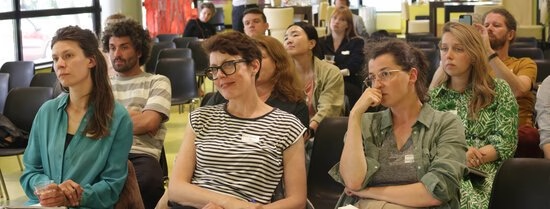What would it be like to live, teach, research, and work with and in a regenerative university? By utilizing micro-phenomenology and ‘reverse fishbowling’, we co-imagined futures for a regenerative university in 2043 during the workshop “The Regenerative University”. It was hosted by Frank Evers, Bas van den Berg, and Guido Stompff of the Expertise Network Systemic Co-Design (ESC) during the DIT Day 2023. This blog is a reflection.
At Erasmus University in 2043, we might be swimming to class, teaching in underground bunkers, or be dispersed into permeable ‘volkstuinen’ across Zuid Holland. Whatever it may look like, EUR has to implement regenerative design principles to get there.
For the workshop, the Expertise Network Systemic Co-Design (ESC) provided eight principles of regenerative education:
tackling urgent and relevant transition challenges
cultivating personal transformations
teaching as self-actualization
nurturing supportive innovation ecosystems
embedding locally with systemic awareness
openness for emergence
shaping thriving futures
holding healing spaces.
These principles can act as guidelines for the non-linear process of designing, observing, and reflecting on educational systems. With these principles in mind, educational institutions can foster the regeneration of individuals as students and teachers, communities, and larger societal transitions. For example, incorporating healing spaces into the design of educational institutions enables individuals to tackle complex and emotional topics related to societal transitions without feeling overwhelmed.

From eco-apocalyptic scenarios to fundamental questions: why do we learn?
We began the session by discussing the eight principles in small groups. We pondered the question: what does EUR look like in the year 2043?Our responses were a combination of eco-apocalyptic scenarios and the human capacity to adapt.
Then, we regathered to take part in a ‘reverse fishbowling’ exercise, where representatives from each group took a central seat to share what their group had envisioned by asking each other questions about the university of today and in 2043. From this conversation, we derived an important question: why do we learn? A key answer to this question is helping ourselves and helping each other. When redesigning the university, we determined it is necessary to foster an environment which encourages cooperative and practical learning between students, staff, and the local community.
Participants left the workshop with a refreshed optimism for EUR in 2043, however it may look. We also took with us detailed principles to guide us through the implementation of systemic co-designed regenerative education. Combined with the connections we were able to make during the session, the Regenerative University workshop provided tangible routes to a better future university.
DIT, for example, can use these insights derived from the workshop to help shape their educational development. ESC’s vision of tackling urgent and relevant societal challenges, their emphasis on nurturing supportive innovation ecosystems, and their drive to embed in local contexts already align with the DIT’s position regarding their educational programme. The rest of the principles mentioned above can be incorporated into DIT’s vision for thinking about broader systemic design questions in regards to the university, as well as other societal structures.
The DIT Platform would like to thank Frank Evers, Bas van den Berg, and Guido Stompff, as well as the rest of the expertise network systematic co-design (ESC), for all of their vision and hard work to create and deliver this session. To read more about DIT Day 2023, and the other visions for the future of our university, click here
- CV
About the author
Angelica Vannucci works for DIT as a research assistant and is conducting a digital ethnography on the subject of visible mending and societal transition. She is also a research master student at EUR, studying sociology of culture, media, and the arts.
- More information
About the Design Impact Transition (DIT) platform
The Design Impact Transition (DIT) platform creates infrastructures for transformative academic work at Erasmus University Rotterdam (EUR). Read more about our work here.

